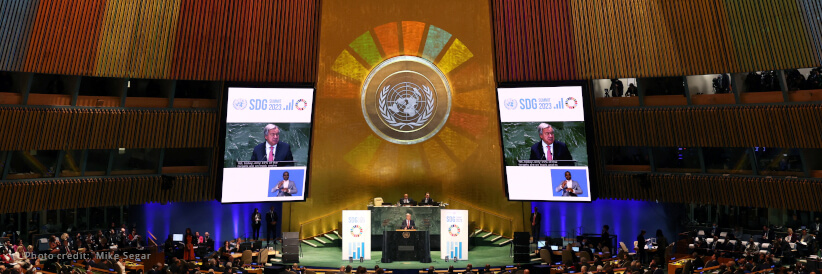Top UN officials called for urgent reforms to the international financial system to boost efforts to achieve the Sustainable Development Goals (SDGs) by 2030.
Addressing the preparatory committee (PrepComm) for the fourth International Conference on Financing for Development, UN Secretary-General António Guterres and Deputy Secretary-General Amina Mohammed highlighted the persistent challenges developing nations face and the imperative for ambitious global financial reforms.
The Conference, which will be held in Spain next year, provides a unique opportunity to tackle these challenges head-on, Mr. Guterres told the PrepComm participants gathered in the Ethiopian capital, Addis Ababa, in a video message.
“It opens the door for world leaders to adopt ambitious reforms to deliver affordable long-term financing at scale – and deliver the SDG Stimulus.”
It is also an opportunity to reform an international financial system that is “outdated, dysfunctional and unfair,” he said, urging “maximum political will” to act and to rescue the 2030 Agenda for Sustainable Development.
“Together, we can deliver not only a financial system – but a world – that is more just, equitable and sustainable,” he concluded.
Bleak outlook
Speaking from the podium, the Deputy Secretary-General echoed Mr. Guterres’ message, recalling the significance of convening in Addis Ababa, a city synonymous with financing for development, where the landmark Action Agenda was adopted in 2015.
See also: UN: World way off track on achieving most development goals
Ms. Mohamed highlighted the disheartening reality that only 17 per cent of SDG targets are on track, pointing to severe financial constraints facing developing countries.
“Many developing countries cannot invest in their future as they struggle to meet their immediate needs: paying salaries and meeting debt service,” she said, adding that international capital is “flowing out of developing economies, rather than in. The economic outlook for developing countries remains bleak. And while the global economy has been described as resilient – there is a soft landing in the North – but there is a crash landing in the South.”
Overcome divisions
Ms. Mohammed highlighted that the need for reform was evident in 2015, and the shocks since 2020 underline the urgency of delivering on commitments and for creating an international financial architecture that can overcome global financial divisions.
Faced with sky-high debt burdens and costs of capital, developing countries have limited prospects of financing #SDGs, UN chief @antonioguterres said in a message to #FfD4 PrepComm in Addis Ababa
More in our story ⤵️https://t.co/BPq2UeD9pi#FinancingOurFuture pic.twitter.com/gqraGH6Lt3
— UN News (@UN_News_Centre) July 22, 2024
“If we are to rescue the SDGs, we need much greater urgency and much higher ambition,” she stressed, outlining six key areas for action.
These include tackling the debt and development crisis; enhancing access to long-term, affordable financing; closing gaps in the global financial safety net; establishing a fair and effective international tax system; harnessing international capital markets; and responding to calls for global economic governance reform.
“We stand at a crossroads yet again. We have a unique opportunity to forge a more effective and equitable global financial system and to unlock financing at scale for those who need it most. We cannot afford to miss it,” she emphasized.
Global kick-off
The preparatory committee (PrepComm) kicks off the process culminating with the fourth International Conference on Financing for Development (FFD4) in Spain in June-July 2025.
Among other tasks, the PrepComm will undertake detailed planning and preparation, initiate negotiations on the Conference’s outcome, and engage with key stakeholders.
Further PrepComm sessions are scheduled to be held in New York (December) and Mexico City (February 2025), alongside an intersessional multi-stakeholder hearing in New York (October).

